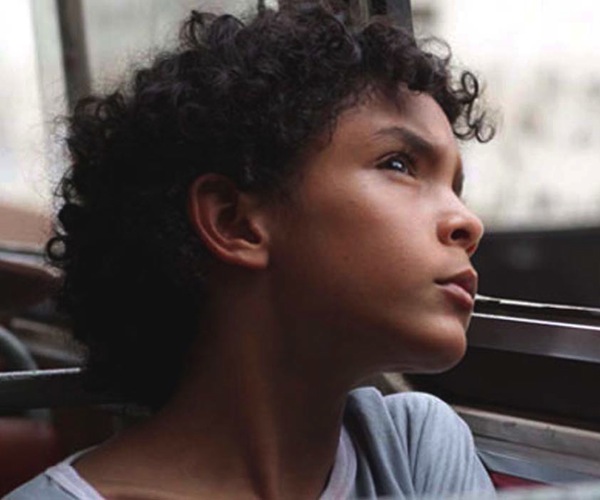Film Review: “Bad Hair” — A Very Good Movie
Mariana Rondón’s Bad Hair is a beautifully acted film about the stultifying pressures on downtrodden lives.
Bad Hair (Pelo Malo), written and directed by Mariana Rondón. At the Barbara and Theodore Alfond Auditorium at the Museum of Fine Arts, Boston, MA, through December 12.

Samuel Lange Zambrano (Junior) in a scene from “Bad Hair.”
By Paul Dervis
The plot is fairly simple. A single mother with two children has lost her job. Living in a depressing housing project in an overcrowded Caracas, Venezuela, she is desperate to get her old security guard’s position back. And she begins to become worried that her oldest son, the nine-year-old Junior (an ironic name considering his father is only mentioned in passing), may have gay tendencies.
But it is not the plot that makes this harrowing character study so special: it is its powerful acting. Or, should I say, its lack of obvious acting. Bad Hair has the feel of a documentary. There are no visible moments of artifice in the portrayals. This is particularly true for Samuel Lange Zambrano, the boy who plays the pre-pubescent Junior. He gives a performance that suggests layers of depth and understanding well beyond his years.
In fact, all three leads, Samantha Castillo as his mother Marta and Nelly Ramos as his grandmother Carmen give seamless performances. And none of these actors have anything close to an extensive resume. Director Mariana Rondón deserves accolades for her casting, her writing, and her compelling visual construction of this complex piece.
From the opening shot we are privy to the complicated relationship between mother and son. Marta, unemployed, has taken part-time work as a cleaning woman for a rich family. With no one able to take care of her boy, she brings Junior with her and puts him to work cleaning the tub. He strips down to his underpants and jumps in. The water straightens his kinky hair, pleasing him to no end. But it doesn’t please his mother at all.
Junior hates his hair. Both Marta and his baby brother have straight hair, and that is what he covets. There is an underlying feeling of racial tension in this film. Junior is clearly mixed race and neither the baby nor the mother appear to be. Although it is never stated, the film implies that there are different fathers and Junior’s dad has most likely died.
Junior’s grandmother wants him to live with her. She has a bond with the boy that her daughter-in-law lacks. She offers Marta cash for him, and Marta, in desperate financial straights, is considering it.
Junior has few friends, none of them boys his own age. School is starting up in a few days and the students need a photo to go back to school. He wants the picture to be of him as a pop singer, complete with fancy outfit and straight hair. The photo keeps being put off because Marta doesn’t have the money to pay for it, giving Junior the time to try to get the curls out of his hair. He tries oil, mayonnaise, and other potential straightening products. Junior’s obsession with his looks reinforces Marta’s fears about his homosexuality.
Marta sees the signs of gayness everywhere. Junior has befriended the young man who runs a convenience store outside their building. Questioning what Junior sees in him, the answer is the man’s ‘beautiful eyes.’ That’s enough to have Marta forbid her son from talking to the guy anymore. Marta takes Junior to the doctor, hoping he can make her son straight. And the hair! The child’s desire to change his hair is the confirmation of this tendency.
Marta’s response to her fears is to expose her son to heterosexuality. Even though she rejects physical contact with him (Marta makes him sit on the opposite end of the couch when they are together in the living room), she insists that Junior keep his bedroom door open while she has sex with her old boss in an effort to get her job back.
In this film, Rondón infuses the screen with a stifling sadness, yet she doesn’t destroy the uplifting strength of the boy’s spirit. This is a harsh, unforgiving Caracas, where the streets are clogged with traffic, and the balconies have iron bars running from floor to ceiling. Throughout the film, television sets are tuned into a popular Venezuelan beauty contest, reinforcing the tragic dichotomy between airbrushed illusion and stark reality. Examples of religious coercion are also touched on in Bad Hair, as well as glimpses of the country’s chaotic political climate by way of reports on various radio and TV sets. The cacophony of sights and sounds adds enormous texture to a simple tale about the stultifying pressures on downtrodden lives.
This film played to great acclaim at this year’s Toronto International Film Festival. It has won awards from Havana to Montreal. It is easy to see why.
Paul Dervis has been teaching drama in Canada at Algonquin College as well as the theatre conservatory Ottawa School of Speech & Drama for the past 15 years. Previously he ran theatre companies in Boston, New York, and Montreal. He has directed over 150 stage productions, receiving two dozen awards for his work. Paul has also directed six films, the most recent being 2011’s The Righteous Tithe.
Tagged: Bad Hair, Boston, Caracas, Mariana Rondón, Museum of Fine Arts, Paul Dervis
